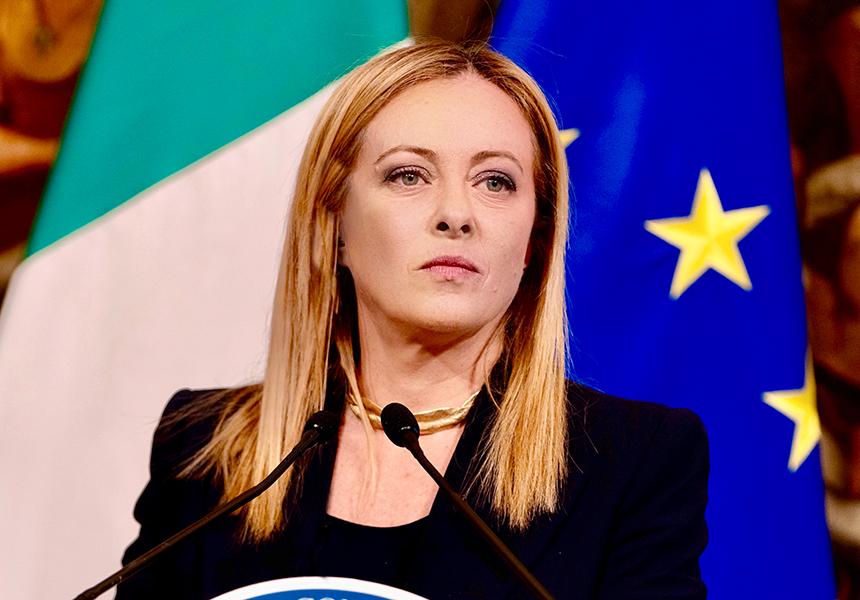Italy Signals Intent to Leave China's Belt and Road Initiative

The Lede: Italian Prime Minister Giorgia Meloni reportedly informed U.S. House Speaker Kevin McCarthy that Italy wants to withdraw from its role in China’s Belt and Road Initiative (BRI) before the end of the year, according to Bloomberg. The individuals present at the meeting said that although a final decision has not been made, Meloni expressed her government's preference for exiting from a controversial investment pact with Beijing.
What we know:
- Earlier this month, Reuters also reported on the issue based on an interview with a senior government official, who said that Italy is highly unlikely to move forward with BRI. But before making the final decision, Rome needs time to hold talks with Beijing as the withdrawal is a highly sensitive issue.
- Sources told Bloomberg and Reuters that the official decision probably won’t be announced before this month’s G-7 summit in Japan on May 19-21.
- Chinese Foreign Ministry Spokesperson Wang Wenbin stated at a routine press conference earlier this week that both countries should continue to leverage the potential for cooperation under the BRI and enhance their mutually advantageous partnership across all domains. He said that between China and Italy, progress has been prevalent in areas such as trade, manufacturing, and renewable energy since the deal was signed four years ago.
- If Italy doesn’t withdraw from the agreement, it will automatically renew for 2024.
- Italian Prime Minister Giorgia Meloni’s office declined to comment to both, Reuters, and Bloomberg.
The background: Italy joined BRI in 2019 under Prime Minister Giuseppe Conte, becoming the first G-7 country to endorse China’s initiative. Italy's decision to join BRI caused some controversy within the European Union and among Italy's traditional Western allies, such as the United States. Critics argued that the BRI would increase China's geopolitical influence. But, supporters of BRI in Italy, including former Prime Minister Giuseppe Conte, have framed the initiative as a potential solution to the country's struggling economy, arguing that it could stimulate trade and attract investment from China. In 2018 Italy exported $15.5 billion worth of products to China. In 2021 the number grew to $19.1 billion. Exports from China to Italy also increased from $36.2 billion in 2018, to $45.6 billion in 2021.
The next Prime Minister of Italy Mario Draghi signaled a more cautious and strategic approach compared to his predecessor and froze the agreement. He called for greater transparency and reciprocity in Italy's economic and trade relations with China.
Before being elected, the current Prime Minister Giorgia Meloni stated that becoming a member of BRI was a “big mistake.” Recently her government has reportedly been under pressure from the U.S. to publicly withdraw from the agreement, according to Bloomberg.
Likely outcomes/Takeaway:
- Italy’s decision on BRI comes at a time when the EU is redefining its relationship with China and struggling to present a united front towards Beijing, as some member states prioritize economic ties while others advocate for a more critical approach.
- Recent comments from the former Prime Minister and Meloni’s coalition partner Silvio Berlusconi of Forza Italia signal that Italy might have a united stance on China. Earlier this week Berlusconi cautioned that the EU would be powerless to protect itself against China and called for a strong military strategy and an increase in investment in defense.
- Italy's exit from the BRI could be seen as a signal that it is re-aligning itself with its traditional Western allies, such as the U.S., and seeking to strengthen its ties with the EU. And that in turn could strain Italy’s ties with China – its major economic partner.
Quotables:
- “There is a need for both sides to further tap into the potential of our Belt and Road cooperation, step up mutually beneficial cooperation across the board and strive to make sure that the outcomes of growing China-Italy relations will bring more benefits to the two countries and people.” – Chinese Foreign Ministry Spokesperson Wang Wenbin.
- “If I had to sign the renewal of that memorandum tomorrow morning, I would hardly see the political conditions.” – Prime Minister Giorgia Meloni in 2022.
- “If China – I say this absurdly, of course – one day decides to occupy Italy, and perhaps some other European country, we would not know how to oppose it at all, and the best thing for us to do would be to go to school and study Chinese.” – Italy’s former Prime Minister Silvio Berlusconi.
Good Reads:
Italy Intends to Exit China Belt and Road Pact as Ties Sour (Bloomberg)
Italy unlikely to renew China deal, but needs time, official says (Reuters)
Italy's New Government to Take Different Position on China (The Voice of America)
